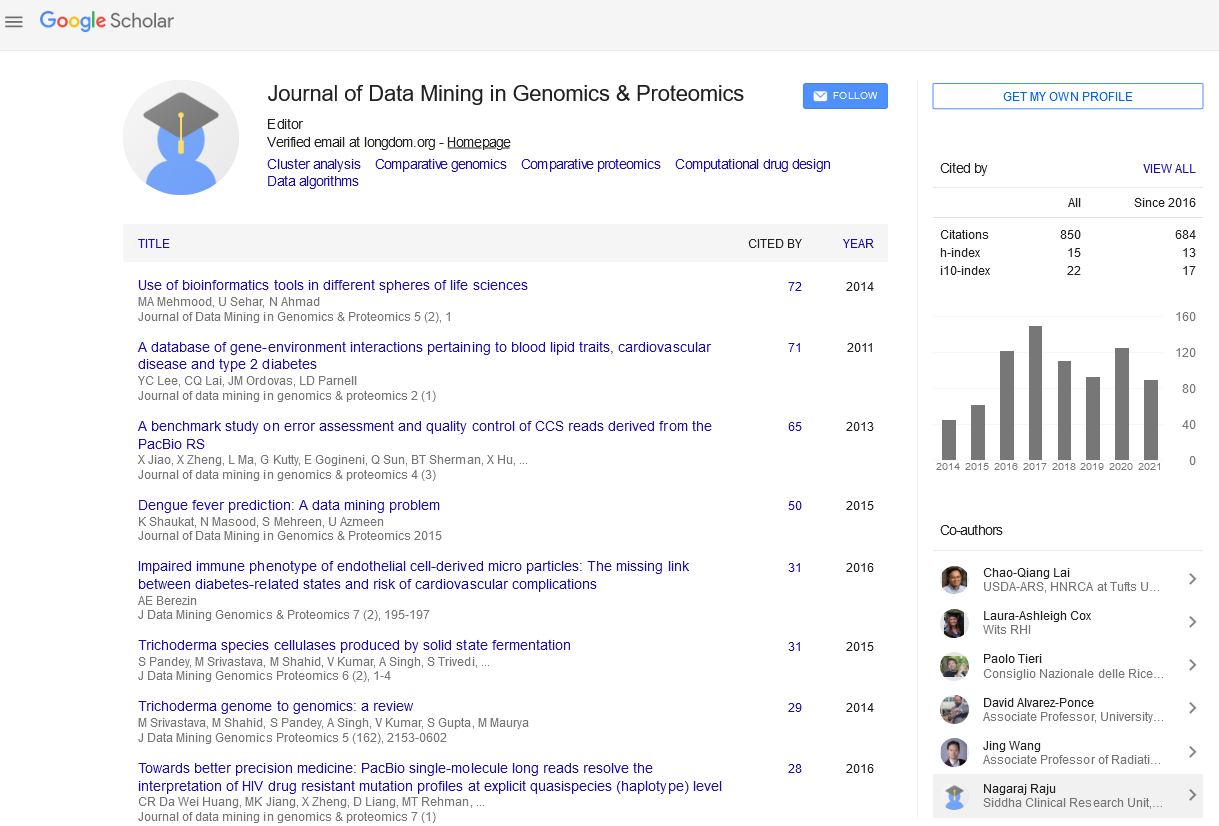PMC/PubMed Indexed Articles
Indexed In
- Academic Journals Database
- Open J Gate
- Genamics JournalSeek
- JournalTOCs
- ResearchBible
- Ulrich's Periodicals Directory
- Electronic Journals Library
- RefSeek
- Hamdard University
- EBSCO A-Z
- OCLC- WorldCat
- Scholarsteer
- SWB online catalog
- Virtual Library of Biology (vifabio)
- Publons
- MIAR
- Geneva Foundation for Medical Education and Research
- Euro Pub
- Google Scholar
Useful Links
Share This Page
Journal Flyer

Open Access Journals
- Agri and Aquaculture
- Biochemistry
- Bioinformatics & Systems Biology
- Business & Management
- Chemistry
- Clinical Sciences
- Engineering
- Food & Nutrition
- General Science
- Genetics & Molecular Biology
- Immunology & Microbiology
- Medical Sciences
- Neuroscience & Psychology
- Nursing & Health Care
- Pharmaceutical Sciences
Pancreatic cancer genetics: Fine-mapping and functional characterization of the chr5p15.33/ CLPTM1L/TERT risk locus
2nd International Conference on Big Data Analysis and Data Mining
November 30-December 01, 2015 San Antonio, USA
Laufey Amundadottir
National Cancer Institute, USA
Posters-Accepted Abstracts: J Data Mining Genomics Proteomics
Abstract:
Pancreatic cancer is the fourth leading cause of cancer deaths in the US. Through genome wide association studies (GWAS), we have identified multiple loci that significantly associate with risk of pancreatic cancer in individuals of European ancestry. One of these lies in a region on chromosome 5p15.33 that harbors the TERT and CLPTM1L genes, the former encoding the catalytic subunit of telomerase reverse transcriptase and the latter, which may play a role in apoptosis. This region has been identified in GWAS of at least nine cancers. To investigate the complex genetic architecture of this region, we have performed imputation and an agnostic subset based meta-analysis across 11 GWAS scans including 6 distinct cancers in over 60,000 subjects. We identified six independent risk loci in this region, five in the TERT gene and one in the neighboring CLPTM1L gene. Between 3-5 cancers mapped to each of the loci, with effects in both directions. Furthermore, we have investigated the CLPTM1L gene and its encoded protein and revealed a positive effect on growth in vitro and in vivo indicating a possible role in carcinogenesis. This effect was abrogated by deletion mutants of predicted functional domains of the protein. Through a proteomics screen we have identified protein partners for CLPTM1L and shown that it may play a role in cytokinesis. Our results provide strong support for extensive pleiotropy across this region of 5p15.33, at a level not previously observed in other cancer susceptibility loci and indicate that CLPTM1L may play a role in cancer.
Biography :
Laufey Amundadottir completed her Ph.D. from Georgetown University and postdoctoral studies from Harvard Medical School. She was the head of the Division of Cancer Genetics at deCODE genetics in Iceland before joining the NCI where she is an investigator in the Laboratory of Translational Genomics. Her work focuses on genome wide association studies in pancreatic and prostate cancer, fine-mapping and functional characterization of plausible causal variants in order to understand how common sequence variation plays a role in the development of cancer. She has published more than 40 papers in reputed journals and is a leading member of the Pancreatic Cancer Cohort Consortium, PanScan.


